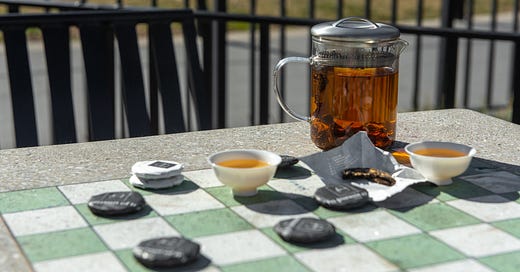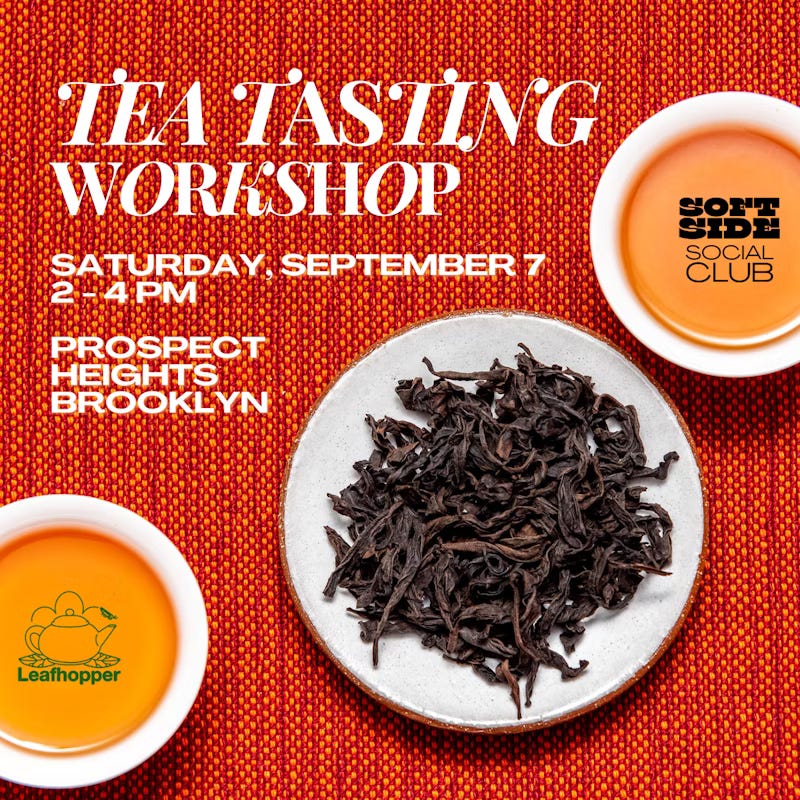My water treatment regimen
Plus Leafhopper's first public tea tasting in Brooklyn on September 7th.
Drink tea with me on September 7th!
Live in or near New York City? Want to share some of my private stash? Come join me and my friend Veronica Chan for a tea tasting afternoon at her beautiful Prospect Heights brownstone on September 7th from 2 to 4pm. I’ll be brewing three special teas from my collection, including a 30-year-old aged variety and a batch that’s not available for purchase anywhere. Your ticket includes some tea samples for home enjoyment as well as a month of free access to Leafhopper’s paid deep dives.
This will be an intimate session capped at 10 people. In addition to good drink, we’ll go over some of the finer points of brewing and understanding traditional teas. I’ll also share personal stories from my research trips to tea gardens. We look forward to seeing you there!
Resplendent raspberry twang
The tea: Old Tree Rou Gui oolong, sold by Old Ways Tea. $29.76 for 48g.
For a long time I had little interest in yancha, the sought-after oolong specialty of Fujian’s Wuyi cliff region. The tea was expensive. The way people talked about it, accessing good yancha seemed impossible. Then a switch flipped, and earlier this year I found myself craving yancha’s singular roasted verve, as if I was pregnant and nothing else would satisfy. Tea is a good hobby for those with peripatetic tastes. The dried leaves keep well and afford you time to hop around regions and styles.
I decided to take the plunge and order samples from yancha specialists that the internet held in high regard. I’ve covered some of those purchases before. This one is another. I specifically wanted teas with a balance of quality and affordability: $25-bottle-of-wine kinds of tea that have something to teach but don’t make you fret about how much you’ve spent with each sip. It’s easy to get intimidated by the hubbub around famous teas, as I was with yancha. The varieties I’ve tasted from Old Ways Tea have been a good stepping stone to help me find what I like, and I like this rou gui. Now I’m in what you could call my yancha era. I love the fullness of the cliff tea sensory experience, where every part of my mouth is activated with something to notice. Good cliff tea makes your mouth water at first sniff. Its mineral sweetness reaches deep down your throat, and its finish reverberates like a well struck gong.
The source: Many yancha producers pack their leaves in single-serving 8 gram packets. Old Ways Tea, the project of Mengjiao Cyr, who has family ties to the Wuyi tea industry, sells all their tea this way. You can decide for yourself if this is convenient pre-portioning or frustrating prescriptive packaging. The Old Ways website has a nice library of information about Wuyi cultivars that helps apply meaningful differences to opaque names like rou gui, shui xian, and da hong pao.
To brew: Like most mid to high end yancha, high dosage, small pots, and full boiling water are the tricks to good steeps. I dispense my 8 gram packets into a 95 milliliter clay pot (1g/8ml), which fills it a little more than halfway. Some drinkers may consider this a low dose and prefer to pack the pot right to the brim. Brew with steeps of just a few seconds, lengthening as you go. I get an immediate gust of tea wind down my throat that opens my chest and makes me ready to face the day. Woody and tangy berry notes come after. Be sure to sniff the pot, the full cup, the empty cup, and the air between your teeth as you drink this one. Yancha aromas are powerful and worth paying attention to.
What’s the best water for brewing tea?
Do you ever stop and think about the miracle of running water? Here is a tap in my home—multiple taps!—that grants me access to as much life-giving water as I can drink. It costs virtually nothing. It’s treated to be free of disease. And as easily as it arrives in my faucet, it disappears down a drain to go…somewhere. The infrastructure that makes it possible is staggering to consider. Kings of old couldn’t imagine such bounty.
Against such a miracle, I feel like a punk speaking ill of tap water. But once you drink enough tea in enough places, you can’t help but notice water’s impact on the flavor of your brew. Some of my standby teas taste unrecognizable when I travel with them to other cities. Or a tea that I’ve tried in a local shop behaves totally different when I brew it at home. Hard, mineral-heavy water can contribute skunky or bitter notes to a tea. I encountered this issue when I lived in Chicago, and in retrospect I wonder if my interest in heavily spiced teas at the time was a subconscious means of accounting for the quality of the local tap. Alternatively, water that’s unusually low in minerals can make tea taste lifeless and flat. You can try this yourself by brewing tea with distilled (chemically pure) water and comparing it to tea made with tap. The distilled water tea will likely taste thin and weak.
Tea people who care about their water undertake all kinds of rituals in search of a better brew. One friend drives upstate to fill carboys with mountain spring water. Some who live in places with hard or unpalatable tap water choose to brew their tea with bottled. Tea shops might invest thousands of dollars in filtering systems for their taps. I think of these protocols less as established best practices and more as folk remedies. While we can infer some generalities about how tea responds to different water sources, the particulars inevitably come down to the individual. Then there’s the amount of effort you’re willing to put into thinking about water, which may very well be none. If you’re reading this and suddenly freaking out that your water is subpar, think less about the best possible water for brewing tea and more about the best water system for you. So let me tell you what I do.
Keep reading with a 7-day free trial
Subscribe to Leafhopper to keep reading this post and get 7 days of free access to the full post archives.









